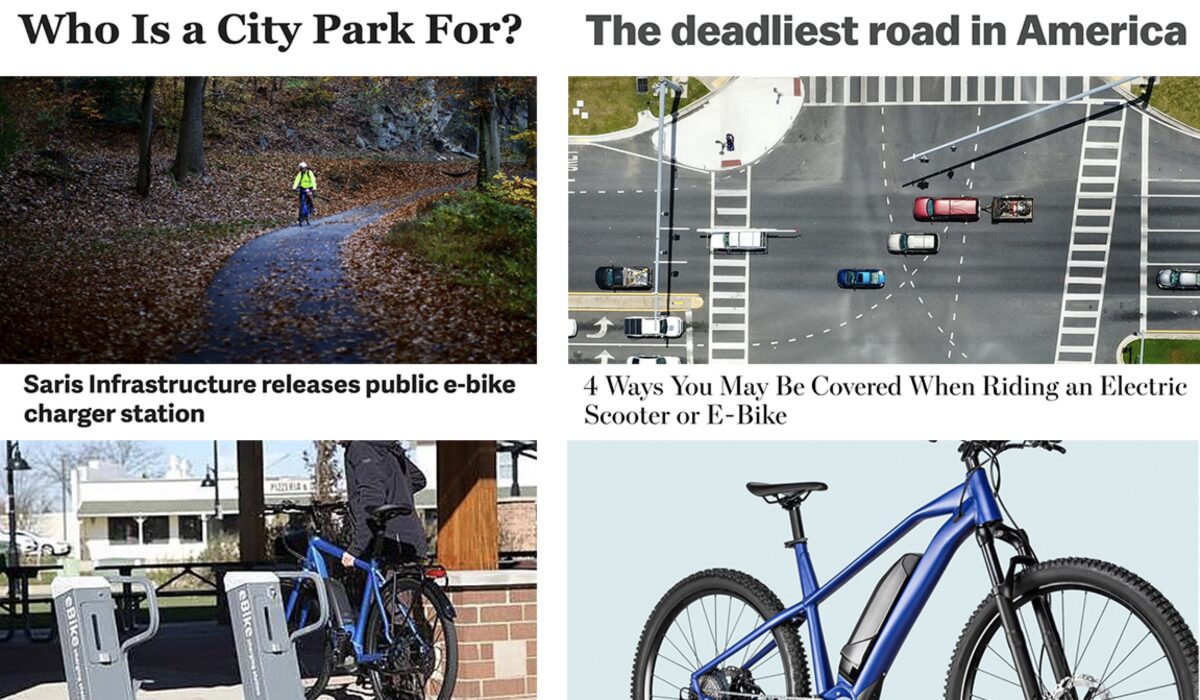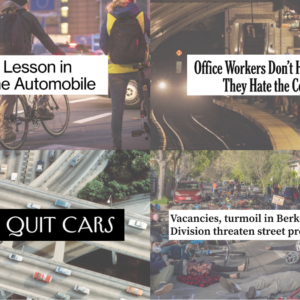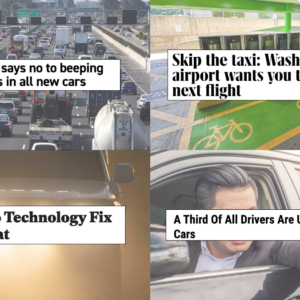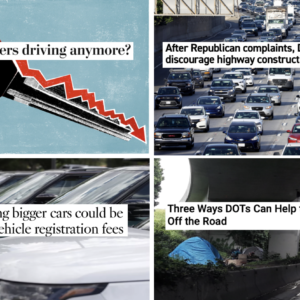
Welcome to the week. Here are the most notable items our writers and readers came across in the past seven days.
Speaking of seven, this week’s roundup is sponsored by Seven Corners Cycles, where you can get 20% of the entire store during their big liquidation sale going on now through August 14th.
An ode to our mode: This wonderful reflection on what cycling means to NPR journalist Bill Chappell is a much-needed reminder of why the mere act of pedaling can be so deeply necessary for some of us.
Cars in parks: Slate says a decision by the National Park Service to let drivers back into a formerly carfree park in Washington D.C. is, “is a perfect example of some of the blind spots of modern American environmentalism.”
Times has changed: Feels like the pendulum has officially swung when the editorial board of the LA Times comes out in support of prioritizing people spaces over parking spaces.
E-bike charging: Given my interest in seeing governments investment in EV-bike charging at a commensurate level of EV-cars, this new e-bike charging station made by Saris caught my eye.
Traffic safety and race: The latest national numbers say that the rate of Black Americans as victims in fatal traffic crashes went up 23% in 2020 compared to the previous year, the largest of any racial group.
Free transit in Boston: Given how split Portlanders are on the idea of free public transit, I think it’s a good idea to read about how Boston is faring under the policy thanks to (relatively) newly elected Mayor Michelle Wu.
Nick Offerman rides a bike: The wonderful actor from Parks & Recreation shares tales of his bike commutes in New York City and Los Angeles and throws stinging barbs at jerks in cars.
Bike thieves really suck: A Portland man who got an e-bike after suffering a traumatic brain injury only to have it stolen the first day he rode it (thieves cut through a pole!), is raising money via GoFundMe to buy a(nother) new bike.
Deep dive on a deadly road: This must-read Vox piece explains the national traffic death crisis through the lens of America’s most deadly road, US-19 in Florida.
E-bike insurance: The Wall Street Journal has some good advice on how to make sure you have insurance coverage while riding your e-bike or e-scooter.
Thanks to everyone who sent in links this week!







Thanks for reading.
BikePortland has served this community with independent community journalism since 2005. We rely on subscriptions from readers like you to survive. Your financial support is vital in keeping this valuable resource alive and well.
Please subscribe today to strengthen and expand our work.
Re: the most dangerous road in America
I think articles like that really miss the point when they talk solely to victims families or people who are concerned about the road. Blaming it on civil engineers is silly. The reality is that 90%+ of that county in Florida are completely okay with the amount of road deaths, as long as those road deaths continue to be people who are abstract to them. Anything to maintain the wide, fast roads.
Most people are at least okay enough with our roads being deadly to maintain the status quo. Even in Portland, PBOT has to be dragged kicking and screaming into road safety projects. They wont even install traffic calming infrastructure on our few “greenways” because they want to maintain motorist access and speed above all else.
America is just a really sad society where individual wants always outweighs collective needs.
There needs to be a culture shift away from cars and towards biking and walking. But at least this is something we can actively work on. Talk with your neighbors, get involved in your local politics, be loud and show people the alternatives. Start discussions. Find the closest car centric infrastructure project and protest it.
I am an individual, and I want to bike with my family to the grocery store not because it is better for society or all but because I enjoy it and it is cheap.
Article quote that sums up ODOT and PBOT and all other DOTs as much as FDOT:
“FDOT’s reason for living is to get as many people as possible, as far as possible, in the least amount of time. That’s their issue,” Marlowe says. “It may not be written that bluntly, but that’s it. In the case of Frank and myself, we’d like people to slow down.”It’s a fundamental conflict, one that plagues communities like New Port Richey all over the country.
State transportation departments, Dumbaugh, the urban planning professor, says, designed arterial roads to be high-speed and efficient ways of carrying lots of traffic. Land developers then built up property around the roads. “Once that happens,” Dumbaugh says, “you’ve put together a few things that are fundamentally incompatible.” Add more housing to the mix and you’ve got a situation where people are walking, Dumbaugh says, “in environments that were never designed to accommodate it.”
SE Powell from I-205 to 174th through East Portland is a case in point. When ODOT announced its intention to redesign the rural wide-shoulder roadway in 2010, they had assumed it would be a continuation of inner Powell and of the Gresham Powell, two lanes in each direction, given the high urbanization over the previous 30 years. However, the Portland neighborhoods of Powellhurst-Gilbert and Centennial, the 2 largest in the city by population, made it abundantly clear that what they wanted was a “main street” of one lane in each direction with sidewalks and bike lanes on both sides, wanting to avoid the example stroad on nearby Division. Ultimately the neighborhoods won out, and that is exactly what ODOT is now building, with lots of crossings and lots of congestion.
On the deadliest road article:
I am so glad to see a major news outlet blame “a rise in aggression” for the increase in pedestrian deaths but the real root cause: prepandemic traffic slowed cars down increasing safety.
Also interviewing Charles from Strong Towns is good to see. I am not a capitalist myself but if there is a platform that is palatable to the American public that condemns car centric urban design as the economic drag that it is, it is Strong Towns. Glad to see it gaining more mainstream light in the last couple of years, it does make me think we might be on the precipice of change.
Yeah bike thieves really suck! But we’re supposed to just look the other way when you see piles of bikes and parts.
The article by Bill Chappell about bike positive experiences mentioned the Tour De France. The race is over and done with. BikePortland ignoring this, the biggest event in cycling. I find it unfortunate that as this news and entertainment source changes, it moves away from the topics that brought me here.
We’re not ignoring it Granpa. It’s a bike race happening in France… which is a bit out of our editorial scope. Haha. Seriously though, we have a lot on our plates and I just haven’t made any major mentions of the race this year.
There are dozens of English language news outlets that cover pro cycling, many of whom have reporters on the ground in France. I can’t imagine how this blog could improve on or add to the reporting that others are already doing in an effective way. It’s nice that Jonathan covers local racing events from time to time. But there isn’t much of a Portland or Oregon related angle to any of the tour de France.
BikePortland has certainly gone off the rails lately with their more pro-anarchy views but then again nobody is forced to come here either. Sadly I too wish it was more of a “bike” blog but it’s morphed into something much different than that. I’ve seen so much bike infrastructure lost seemingly forever and this blog just writing it off like its nothing. Jonathan is always quick to come to the defense of the decay which is disappointing,
I’m pro-anarcho-syndicalism and I can assure you that bike portland does not come across as pro-anarchy at all.
I agree with Jonathan this time (and I usually don’t agree with him). Not only do many other bike-specific websites cover the TDF, but the major news outlets do too. That said, I’m pleased to report that I’ve won many stages of the TDF. The only problem is that this always happens inside my head only, when I’m fatigued, thirsty and hungry at the end of a long ride on a hot day.
Finally, an ebike charger that lets you lock your bike up while you charge. I wonder if our leaders in Oregon will follow suit with their recent dog-and-pony electric plug show.
Bike Thieves suck…yes they do. And this is a sad tale (hopefully with a better ending) of many things that continue to hold the bike boom back in Portland and in most US cities: older [New Seasons] work site without secure long term employee bike parking [like some do], PBoT public works installing a traffic sign pole repair that is even less secure now (‘sucker pole’ allowing removal with tool) for public bike parking, public bike racks that are not e-bike level secure (lack of guarded Bikestation like for long term or even short term parking), poor parking security education by bike shops to new customers (my assumption), etc.
I’ve started to notice poles around town with their tops chopped off at about 5-6′. It didn’t click, but just now I thought how those are likely where bikes were parked, tops cut off, bike lifted up and over what remained of pole.
Still shaking my head.
That Offerman editorial is an absolute gem, and everybody should read it (cyclist or otherwise).
The bike theft story just makes me want to ride bike town bikes everywhere (or not go anywhere by bike). Not a cost effective solution, nor do the boost settings allow you to get a decent workout. But I don’t want to risk my own bikes when thieves can operate brazenly and with impunity
Free Transit in Boston: The headline makes it sound like transit is free in Boston citywide, but it isn’t, it’s just 3 particular lines that are free, paid with Covid stimulus funds.
Cars in Parks: I’ve ridden on the Rock Creek Park paths a few times, they are not particularly good. It’s not a city park, but a National Park that happens to be in a rich white section of DC full of embassies and rich snobs, in a canyon-like valley near the DC Zoo and National (Episcopalian) Cathedral. The park belongs to the whole country, not just local DC snobs. If cars are kept out, how about ebikes and mopeds? Or how about adding speed tables and other traffic calming features to slow traffic down?
Beg to differ. Was a DC resident back in the day and go back there from time to time to visit. Rock Creek Park/Beach Drive is an absolute gem – it was kind of surprising to me after I moved to realize there’s really nothing like it here in Portland, given the relative bike-friendliness reputations of the 2 cities.
It’s a welcome oasis in the city and part of what makes it so special is the fact that it’s car-free, at least it was the past 3 years and I believe it was car-free on weekends or maybe Sundays way back when I was living there. DC is a very diverse city as I’m sure you’re well aware of, and that level of diversity can be seen any time you ride/walk/run/blade/play along there. You’ll encounter all types of folks when riding there and it’s a wonderful thing. It’s not nearly so nice when cars are on it which renders it inaccessible to all but the more experienced riders (I guess these would be your “local DC snobs” huh?).
Well that’s a pity. Hopefully they’ll at least continue to make it car-free on the weekends?